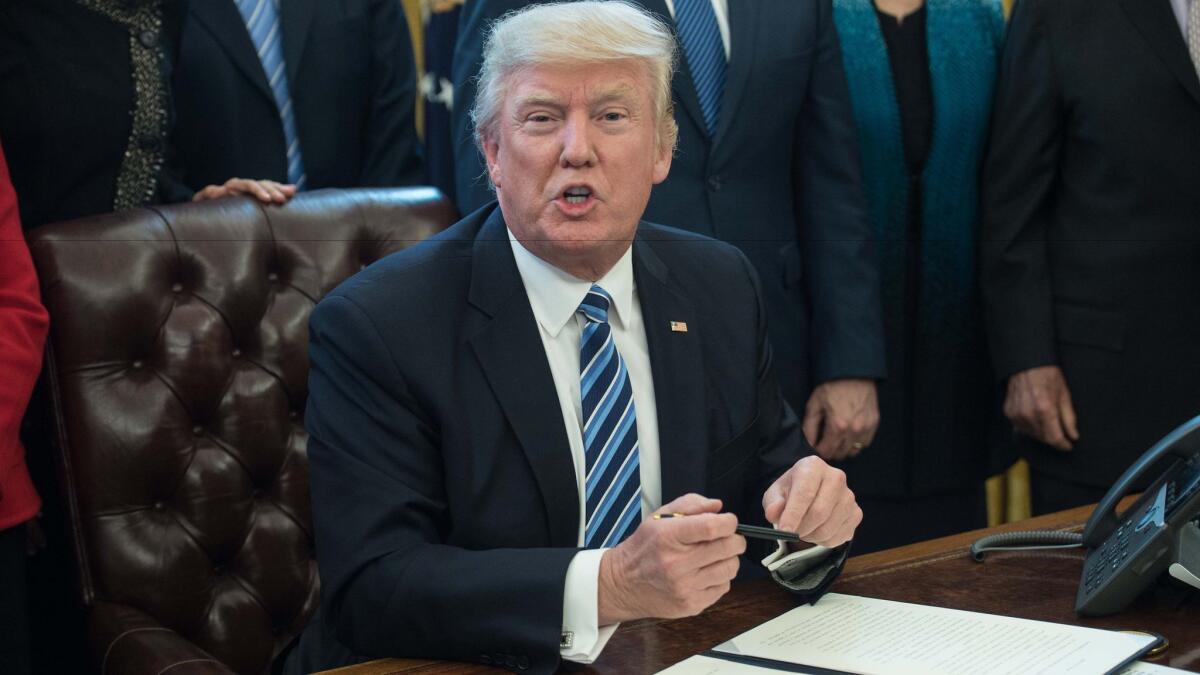Another day, another coronavirus flip-flop from Trump — the emperor of inconsistency

- Share via
There is no Trumpism, only Trump.
One of the most vexing things for both fans and foes of President Trump is that he has a gift for being neither the hero nor the villain people like to cast him as. In 2016, when Trump refused to answer a question about whether he would accept an election defeat, New York Mayor Bill de Blasio said, “The words that you heard from Donald Trump are what you’d expect from a Third World dictator, what you’d expect from a military leader about to attempt a coup in a foreign country, not from an American presidential candidate.”
Four years, and a litany of similar denunciations later, with Trump firmly in office, the same Mayor De Blasio excoriated the president for refusing to use his powers to deploy the U.S. military on the streets of his city to combat the pandemic.
This damned-if-you-sound-like-a-dictator, damned-if-you-don’t-act-like-one dynamic is just a small example of why our politics are so disorienting.
And not just for Trump’s foes.
To the surprise and perhaps disappointment of many a self-declared nationalist in the MAGA mold, the man who vowed “I alone can fix it,” has very much led from behind in his “war” on the pandemic, insisting that federalism required him to let state and local officials lead.
“We have a thing called the Constitution,” Trump huffed at one of his news conferences, defending governors who hadn’t issued stay-at-home orders yet. “I want the governors to be running things.”
And his supporters have cheered him for that. “Why States ‘Governing Themselves’ During The Coronavirus Outbreak Is A Good Thing,” proclaimed the headline on one typical piece in the Federalist magazine.
Trump was largely correct about the Constitution, even though he certainly could have done more. Governors hold most of the “police powers” in our country. The president, at least without considerable authorization of Congress, cannot ban interstate travel, shutter businesses or force people to stay in their homes, nor can he (or governors either) force people back to work if they don’t think it’s safe to leave their homes.
The problem, as is so often the case, is that Trump’s motivations are virtually never rooted in any overarching theory or principle. Trump’s invocation of federalism was never grounded in constitutional fidelity but in a desire to avoid blame and have local officials he could second-guess or scapegoat.
“Gov. Inslee, that’s the state of Washington.... And you know, he’s always complaining,” Trump told Fox host Sean Hannity. “And your governor of Michigan, I mean, she’s not stepping up. I don’t know if she knows what’s going on. But all she does is sit there and blame the federal government. She doesn’t get it done. And we send her a lot.”
He was a very sick man when he arrived in our emergency room, but he was more worried about the hospital staff than about himself.
As transparently annoying as that strategy was, it was playing well with many conservatives — both those in the MAGA camp, who liked to watch Trump beat up the libs, and the genuine believers in the Constitution’s federalist principles.
But then, Monday morning, Trump upended things again, insisting that of course he had the kind of power he’d been saying for weeks belonged to the states. “For the purpose of creating conflict and confusion, some in the Fake News Media are saying that it is the Governors decision to open up the states, not that of the President…,” Trump tweeted. “Let it be fully understood that this is incorrect.... It is the decision of the President, and for many good reasons.”
The story of the Trump presidency has been one of a man making off-the-cuff decisions based on his instincts. He’s bragged about this being his method for years, but that doesn’t stop fans and foes alike from concocting grand theories of ingenious foresight or villainous plotting. Trumpism must be something more than one guess after another, they assume.
It isn’t.
Trump’s reversal on federalism makes no sense if you think Trumpism is a coherent ideological framework. It makes complete sense if you work from the assumption that Trump is guided by a craving for importance and an insatiable need to be the center of attention.
This is the true constant of the Trump administration. Trump stakes out a seemingly clear position, making it the party line for his followers on the right and the focus of derision across the left. But the moment a policy detracts from his gut-level needs, the policy is tossed. Because there is no Trumpism. There is only Trump.
More to Read
A cure for the common opinion
Get thought-provoking perspectives with our weekly newsletter.
You may occasionally receive promotional content from the Los Angeles Times.










